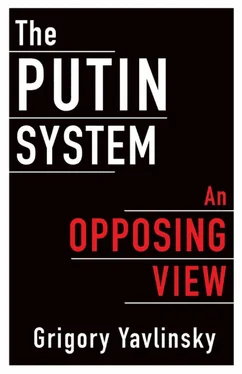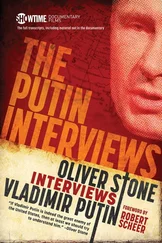With regard to the individual motivations of political leaders and the energy required to make these motivations work, the biological aspect of human nature leaves only a short time span in history during which leaders can play any role. Given the lack of turnover in government, which is one of the essential features of authoritarianism, the unavoidable result is the rotting of authoritarian regimes. That is, Russia’s interest in reaching certain goals that are meaningful for the nation as a whole yields fairly quickly to the ruling circle’s one-sided focusupon the acquisition and the divvying up of “legitimate spoils”—administrative rents.
IN SEARCH OF AN IDEOLOGY
The typical authoritarian political model as we know it from history has several systemic features. One feature that plays a significant role is the fuzziness of its ideological underpinnings. This is mainly due to authoritarian systems’ interstitial positioning between, on the one hand, competition-based systems, in which ideology is actively employed to differentiate among political groups competing among themselves for the right of temporary access to the levers of governance, and, on the other hand, totalitarian systems, which use rigid dogmas of a particular totalitarian ideology as a tool for winning and maintaining power.
Totalitarian systems need an ideology in the form of a set of ideas and beliefs intended to be implanted into the consciousness of every individual and into society as a whole as the only valid set of views about the world. Such an ideology serves as a potent tool of political control over society, used to galvanize its members for action and to mobilize them in defense of the system when necessary. Totalitarianism always and everywhere relies first and foremost upon organized coercion applied to society by the powers that be. But such violence cannot be the sole basis of its power because it cannot provide strong enough cohesion to society without at the same time brainwashing people to instill in them the ideological motivations to act in the ways expected by the system and its leaders. Hence the need for “the only true teaching,” with its concomitant rituals, cults, and role models, as well as the tireless and perpetual fight against this teaching’s enemies, whether open, hidden, or even potential.
But competition-based political systems also call for ideological underpinnings. They are needed for the system as a whole, for its basic principles and general structure, and we can therefore think of democracy itself as an ideology. Ideology is also needed by the individual competing groups that are vying with each other, at least pro forma, not as clans built around the shared personal interests of their members but as like-minded people voicing shared beliefs about what makes a just and effective form of politics. In turn, these beliefs are most often at least superficially bound together by a certain system of views about the proper or fair organization of society—which is essentially what we call an ideology. [4] I am talking here not about ideology in its broader sense, as an element of the social consciousness of a community of people, but rather about specific ideological systems that serve as political tools.
This is exactly why competition-based political systems tend to include a rather diverse spectrum of ideologies, even though the interests of the system’s survival compel it to keep this diversity within certain boundaries—which means, in particular, suppressing various totalitarian ideologies, including religious currents with a totalitarian bent.
Meanwhile, authoritarian systems, positioned in the middle between totalitarian and competition-based systems, tend to be rather colorless, in ideological terms. Within the framework of such a system, the authorities usually do not pursue total control over citizens’ minds and do not try to impose upon them uniform views about social and political developments. Sometimes such self-restraint is the conscious choice of the rulers and sometimes it is due to the lack of necessary resources. Either way, an authoritarian state does not pursue such goals and instead limits itself to controlling financial resources as well as administrative and coercive power.
Given that such control is quite sufficient for the authorities to safeguard themselves and to perpetuate their power, they pay scant attention to ideology and to what goes on in people’s hearts and minds. And since an authoritarian power does not seek to instill ideological uniformity, it tends to permit the existence of various currents of thought in society, public debates among them, and even “soft” forms of organizing among like-minded individuals. This organizing is allowed as long as it does not lead to the emergence of political organizations possessing large amounts of resources and capable of claiming power in society and government. Moreover, objectively speaking, ideological debates in society turn out to benefit the authoritarian government because such debates prevent those unhappy with the government from unifying within a single camp, due to the conspicuous ideological differences among the forces interested in bringing the current power system down. And the broader the ideological spectrum, the less likely it is that the opposition groups will coordinate their activities with one another.
Although the autocratic rulers themselves usually try to project some ideological power, they are not good at that; they are not making the effort, they are not enthusiastic, and they usually do not achieve any lasting results. In such a system, government agencies are staffed with individuals selected according to the convenience of working with them and the opportunities to extract revenues in the form of administrative rent. Although the system undoubtedly requires them to display outer loyalty, it usually does not impose any particular demands upon their mind-set or views. Thus, because the characteristics required for comfortably operating within the system are distributed among people according to the laws of nature and do not closely correlate with their ideological preferences, the resulting composition of government staff tends to be rather diverse, in ideological terms.
And even though the ruling corporate circle unquestionably projects certain ideological messaging for public consumption (typically emphasizing patriotism and deep-rooted values), it is devoid of internal cohesion. Unless an authoritarian system morphs into a totalitarian one, it remains an eclectic assortment of individuals who are ideologically and even culturally quite different from one another. Accordingly, every attempt to produce an ideology that would bring everyone together ends with a standard menu of trivial statements against the backdrop of everyone’s blatant hypocrisy.
This feature of authoritarianism fully manifested itself in Russia’s political system of the first decade of the twenty-first century. In the 1990s, when authoritarian rule was beginning to take shape and when the abandonment of a competition-based political system as a lodestar for post-Soviet Russia was not yet so obvious, the ruling circle tried to differentiate itself ideologically from those groups that it was promoting into the role of the opposition; the authorities were actively trying to play the ideological role of the “reformers.” This was made simpler by the fuzziness of the goals that were officially proclaimed as the direction of government work and that were overwhelmingly shared by the ruling circle. These goals included transition to the market, development of private ownership, loosening of restrictions on contacts with the West, recognition of ideological pluralism, and so on. The obvious difference between these goals and the foundational principles of the Soviet era enabled individual authorities to distinguish themselves through rhetoric about things like the “policies of reform” or the “reformist spirit.”
Читать дальше












